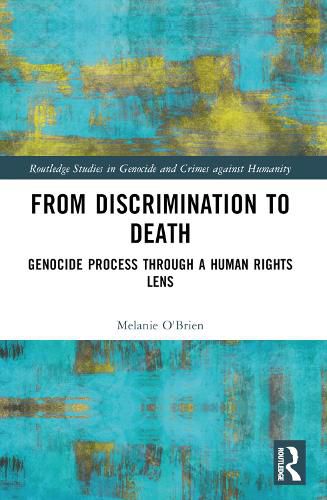Readings Newsletter
Become a Readings Member to make your shopping experience even easier.
Sign in or sign up for free!
You’re not far away from qualifying for FREE standard shipping within Australia
You’ve qualified for FREE standard shipping within Australia
The cart is loading…






From Discrimination to Death studies the process of genocide through the human rights violations that occur during genocide. Using individual testimonies and in-depth field research from the Armenian Genocide, Holocaust and Cambodian Genocide, this book demonstrates that a pattern of specific escalating human rights abuses takes place in genocide. Offering an analysis of all these particular human rights as they are violated in genocide, the author intricately brings together genocide studies and human rights, demonstrating how the 'crime of crimes' and the human rights law regime correlate. The book applies the pattern of rights violations to the Rohingya Genocide, revealing that this pattern could have been used to prevent the violence against the Rohingya, before advocating for a greater role for human rights oversight bodies in genocide prevention.
The pattern ascertained through the research in this book offers a resource for governments and human rights practitioners as a mid-stream indicator for genocide prevention. It can also be used by lawyers and judges in genocide trials to help determine whether genocide took place. Undergraduate and postgraduate students, particularly of genocide studies, will also greatly benefit from this book.
$9.00 standard shipping within Australia
FREE standard shipping within Australia for orders over $100.00
Express & International shipping calculated at checkout
From Discrimination to Death studies the process of genocide through the human rights violations that occur during genocide. Using individual testimonies and in-depth field research from the Armenian Genocide, Holocaust and Cambodian Genocide, this book demonstrates that a pattern of specific escalating human rights abuses takes place in genocide. Offering an analysis of all these particular human rights as they are violated in genocide, the author intricately brings together genocide studies and human rights, demonstrating how the 'crime of crimes' and the human rights law regime correlate. The book applies the pattern of rights violations to the Rohingya Genocide, revealing that this pattern could have been used to prevent the violence against the Rohingya, before advocating for a greater role for human rights oversight bodies in genocide prevention.
The pattern ascertained through the research in this book offers a resource for governments and human rights practitioners as a mid-stream indicator for genocide prevention. It can also be used by lawyers and judges in genocide trials to help determine whether genocide took place. Undergraduate and postgraduate students, particularly of genocide studies, will also greatly benefit from this book.